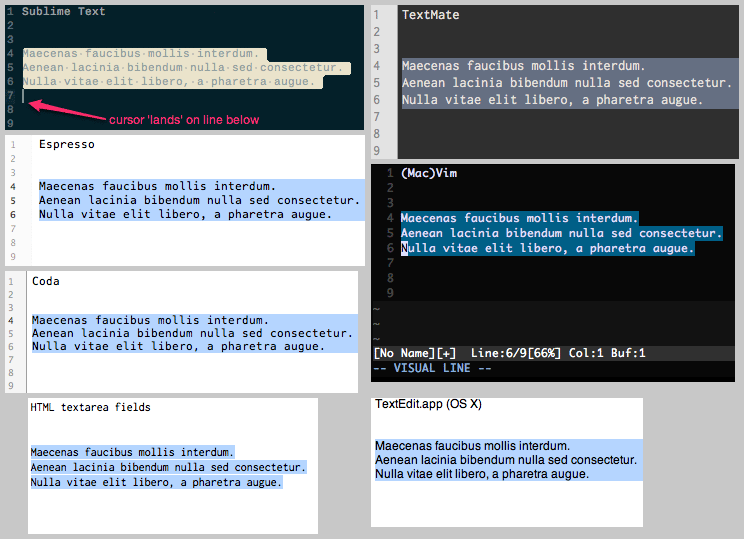
 Shift + Tab
Shift + Tab
I'm a heavy user of Notepad++, and the thing I miss most in Sublime Text 2 is Shift+Tab

 Small typo in API documentation
Small typo in API documentation
Every call to view.begin_end() must have a corresponding call to view.end_edit()
"view.begin_end()" should be "view.begin_edit()".

 IBM Common User Access shortcuts cut/copy/paste doesn't work.
IBM Common User Access shortcuts cut/copy/paste doesn't work.

 Advanced clipboard : Paste From History
Advanced clipboard : Paste From History

 Change default key-binding for selecting multiple lines on OSX
Change default key-binding for selecting multiple lines on OSX

 Sidebar search?
Sidebar search?
I'm new to ST2, but I have a question.
I have a website with tons of images, so I use Sidebar to find them. However, since I have 100+ images there scrolling isn't the option.
GoTo Anything doesn't help, it just finds lines of code, but I need something that will find those files in my Sidebar, highlight them, or at least scroll the sidebar to that specific file.

 Draggable selection
Draggable selection

 Westhill Consulting Travel & Tours Based In Singapore Offers New Family Friendly Trips
Westhill Consulting Travel & Tours Based In Singapore Offers New Family Friendly Trips
 The active travel
consultant company Westhill Consulting Travel & Tours based in Singapore
sets international adventure vacation standards. The company announces 10
new-for-2014 adventure destinations that are all value-driven family.
The active travel
consultant company Westhill Consulting Travel & Tours based in Singapore
sets international adventure vacation standards. The company announces 10
new-for-2014 adventure destinations that are all value-driven family.The company’s founder and CEO says, “I know how important family is and I value keeping the family tradition going. It has been my personal mission in life. This year we took a closer look at our itineraries and prices and offer as much value and relief as we can. We offer kid-friendly lodgings with exemplary service and cuisine, all at a very competitive price. We assure you won't be having any complaints.”
Westhill Consulting Travel & Tours Singapore accept children of all ages. And since there are no age restrictions on custom and private trips, family trips are becoming increasingly popular. Grandparents can also come with travel plans, including extended family members.
The company has carefully designed itineraries to include supervised activities for kids while adults enjoy a candlelit meal or some private downtime. A special child pricing for the child or children with parents or grandparents is offered. There are also some other special offers for families such as an extra guide and van and such-kid friendly equipment as tag-along bikes, squirt guns and games.
“We've created the perfect blend of cross-generational activity, comfort and adventure to satisfy adventurers of all ages with many choices and flexibility on our family vacation trips,” Westhill says.
Accommodations are carefully designed to combine child-friendly elements.
Laser Game
Technology has improved on paintball and now you can enjoy the same fun as paintball without the pain of getting hit or the mess of the paint. Laser Game uses infrared technology to record hits on an individual or a team. At the end of the session a printout is generated with the record of all the action during the 15-minute session. Played in a maze with black light, this is a great activity for children 8 years and older - all the way to adults. Corporations are a using a lot laser games as a way to encourage team building or outings for their young executives. The company offers a free training session which includes safety advice and warnings.
Kidzania
Kidzania is a role playing indoor theme park. Children are given the opportunity to work at over 70 professions with opportunities to become a doctor or a pilot or baker for the day. They are paid with Kidzos, the official currency of the park. There are two sessions during the day, 9:00– 2:00 and 3:00 – 8:00. Because of its popularity, it is best to make reservations for your child. Kidzania is located in Pacific Place Mall in Jakarta.
See more:
http://www.goodreads.com/group/show/108506-westhill-consulting-travel-tours-inc
https://www.facebook.com/pages/Westhill-Consulting-Travel-TOURS-INC/577899938919864
https://foursquare.com/westhilltravel

 Tabs as seperate windows, on Windows 7
Tabs as seperate windows, on Windows 7

 What Credentials Are Needed to Become an Insurance Investigator?
What Credentials Are Needed to Become an Insurance Investigator?
High School
Insurance companies usually require a high school education or the equivalent for insurance investigator jobs, according to the U.S. Bureau of Labor Statistics. Take speech classes or join the debate club in high school to develop the interviewing skills you will need as a future investigator. Take courses in English and writing to prepare for the report-writing component of an investigator's career.
College Training
Some insurance companies prefer to hire investigators with college degrees, although no degree is mandatory. The desired degree varies with the type of claims work. For example, an engineering degree is useful for investigating claims in factories, while an accounting degree equips you to investigate business fraud. A bachelor's degree in criminal justice is another path to the job of insurance investigator. A criminal justice program provides a legal background plus the necessary skills in research, investigation and critical thinking.
More At:
Investigator Education at Koyal Group

 5 Insurance-Buying Mistakes to Avoid
5 Insurance-Buying Mistakes to Avoid
1. Assuming insurance is out of reach. The U.S. Census Bureau reports that 48 million Americans had no health insurance in 2012. And about 30 percent of U.S. households have no life insurance, according to LIMRA, a worldwide research and consulting organization for insurance and financial services. In some cases, consumers skip insurance because they think it's out of their budget. Often, that's not the case, according to Marvin Feldman, president and CEO of the LIFE Foundation, a nonprofit organization that educates consumers about financial planning and insurance. The LIFE Foundation collaborated with LIMRA on the 2013 Insurance Barometer Study, which found that the average consumer thinks life insurance is three times more expensive than it actually is. "[Consumers are] not researching it to determine what the cost is," Feldman says.
When buying health insurance or property and casualty insurance, ask about potential discounts. "Two-thirds of consumers don't realize they can get financial help if they buy their own health insurance, and they can get financial help if they go and buy in these health insurance marketplaces," says Lynn Quincy, senior policy analyst with Consumers Union, a division of Consumer Reports. "You may be way overpaying if you don't investigate this possibility." While health insurance discounts are often income-based, homeowners and auto insurers offer discounts for everything from being a member of groups like AARP, to being a good student or a good driver, to having a home security system.
2. Relying on assumptions or outdated figures. Changing economic conditions mean you might need more insurance coverage than you had in the past. Take life insurance. In the past, consumers might have based their life insurance coverage on their current income, but "if something happens and you're no longer around, you need more capital at work to provide the same income [to your beneficiaries]," Feldman says. Disability and long-term care insurance are even more complicated than traditional life insurance. "For disability, do you want coverage that lasts forever? Are there health issues in your family?" Feldman asks. "That's where you need to speak to somebody to get some guidance."
In the case of homeowners insurance, your home could be underinsured if you've renovated or if the cost to build a home has increased due to higher material costs or other factors. That's why experts recommend reviewing insurance coverage once a year to make sure it still fits your needs. Talk to your insurance agent if you're unsure.
3. Shopping on price alone. Comparing insurance policies can be confusing, but resist the urge to simply choose the policy with the lowest premium. Consider the company's reputation and the coverage you'd get for that premium. "As a general rule with health insurance, the higher the premium, the lower the amount you pay when you go to the doctor," Quincy says. Private health insurance plans must provide coverage examples showing what your estimated out-of-pocket costs would be for, say, having a baby or managing Type 2 diabetes. Some examples might not apply to you, but they can help you compare plans and see how much you might pay in coinsurance and copays.
"Make sure you're shopping apples to apples and getting quotes based on the same coverage that you have," says Lori Conarton, a spokeswoman for the Insurance Institute of Michigan. Your property and casualty insurance may not cover things like food spoilage in the event of a power outage or stolen electronics worth more than $1,000, so you may want to purchase extra endorsements to cover those possibilities, she adds.
>>>> LINK SOURCE
http://marx0edward.blog.com/2014/01/31/5-insurance-buying-mistakes-to-avoid/
>>>>FOR MORE INFORMATION
Westhill Consulting About Travel
Westhill Consulting Travel Guide and Tips

 Color-coding file names in the sidebar dependent on last modification time
Color-coding file names in the sidebar dependent on last modification time

 On Selecting Multiple Lines
On Selecting Multiple Lines
I have a small quibble with the way you select multiple lines of text in Sublime – or technically, how you see/perceive what's been selected when doing so.
Let's say you have these example lines below (throw in a couple empty lines above and below) …
Maecenas faucibus mollis interdum.
Aenean lacinia bibendum nulla sed consectetur.
Nulla vitae elit libero, a pharetra augue.
… To reproduce the behavior I'm referring to, please follow these steps:
1. Place the cursor on the beginning of the first line, right before the 'M' (in "Maecenas").
2. Press and hold Shift, then press Arrow Down 3 times.
The cursor lands on the line below the selected lines.
Compare with e.g. Vim's Visual Line selection (pressing capital V in normal mode). I'm hoping for Sublime Text to have the same behavior as when selecting Visual Line in Vim – which is also default in the vast majority of editors and places where you can edit and select text, i.e:
Highlighting only the lines you've selected and momentarily not showing the cursor.
So, my questions are:
- What is the motivation to employ this behavior of selecting multiple lines of text in Sublime?
- Is there a way to switch the behavior into the one that I (personally) am more used to?
I'm posting a reference image that shows the behavior in a few editing environments:
Sidenote: also, in Sublime Text, when selecting in the opposite direction (Shift-Arrow Up) it doesn't leave the cursor alone on the line above the selection. I think this holds some ground for my proposal to adapt Sublime to a more consistent behavior.
Reason for my personal preference towards the more common behavior is, well, because I'm more used to it (from editors like TextMate). In Sublime, it feels slightly more confusing when selecting, copying and pasting multiple lines of code. I believe I *can* get used it, though, and this is not a be-all and end-all issue, but it would be nice if it was possible to accommodate for people like me, who prefer the standard way, if I may call it such.
Regardless of what, in a broad perspective, I'm of course immensely pleased with Sublime Text!

 Search/Replace enhancements
Search/Replace enhancements
Also replace should popup also with ctrl+f (to be honest, most of the times you search something when coding you need to do a replace afterwords, so popiung up the replace dialog is a good idea imo).
The buttons in the search and replace boxes should have a highlighted letter, so that they are accessible via a keyboard combination - for example you search for a word, then enter the replacement for that word and then hit lets say alt+r for replace, and alt+a for replace all (key combinations are of course just a suggestions)

 The Crown Capital Management Global Journalism International Relations Blog: The UK is having a hard time breaking away from trade deficit
The Crown Capital Management Global Journalism International Relations Blog: The UK is having a hard time breaking away from trade deficit
Exports have reached new record levels as it arose, but imports have exceeded as well as its prior highs and thread of shockingly high deficits is almost unchanged. Due to this some scientists say that the recovery will only make the gap grow. The UK continues to import more than they export and are carrying a perpetual trade deficit.
The UK has balanced its trade deficit with income from abroad for a period of time. Many companies and investors who own assets in foreign lands and send back the gains to UK are still enjoying the legacy of the empire.
The positive result on UK’s present account has decreased harshly since the financial crash, but, and the future looks less hopeful.
On this Corner:
The CCM International Relations
HSBC’s chief economist, Stephen King, is also affected by 5% deficit. He argues that that should be down to zero or positive in the aftermath of a severe recession.
King’s concern is that deficits grow in times when many shoppers consume more imported goods than ever. Much better to start from a situation of balance or even a positive balance sooner than the situation worsens.
An appropriate recession, one in which declining wages or mass unemployment that eradicate people’s incomes in total, lessen the import bill noticeably. It is a land that can be seen in Greece, Spain and Portugal, where the horrendous economic and financial conditions they find themselves in have at least improved the trade balance.
The Keynesian answer to the crisis in the UK implemented by Labour and partly sustained by the coalition supports employment and public services; however, as well has the unlucky consequence of preserving high levels of imports. That is the reason the enormous deficits run up by successive governments during and after the recession required to be offset by a major jump in exports.
Regardless of a 25% drop in the significance of sterling, the increase was just small. There are many rival explanations for the reason. The dependence on the EU, which separate from Germany has resisted development since 2008. The inclination for exporters to jack up their prices instead of the increase production as an answer to higher demand is one more long-term problem.
Both give slight motive to expect that an economy that month on month runs a historic elevated deficit previous to the upturn has achieved actual momentum, and with imports increasing further, can evade a mini sterling crisis.
Doomsayers disagree Britain has 18 months to two years to discover its export mojo ahead of it is becoming crystal clear a lower pound is needed. A minor pound would give exporters another increase and perhaps close up the deficit, however, would as well elevate import prices and inflation. Higher inflation, joined with a consumer boom that is mostly based on additional borrowing, may perhaps oblige the Bank of England to jack up interest rates. Whatever supporters of higher rate dispute, a speedy and vicious response from the central bank is unwanted and would convey the recovery to a shaky halt.

 File Open behaviour.
File Open behaviour.

 IntelliSense for jQuery
IntelliSense for jQuery
Since jQuery is very common nowadays, IntelliSense for jQuery would be a good stuff.

 Can't collapse method with big method's header
Can't collapse method with big method's header
void myMethod1(const std::vector >& matches1,
const std::vector >& matches2,
std::vector& symMatches) {
// Some code of method
// ...
// some code
}
If I want to collapse whole method, I get:
void myMethod1(const std::vector >& matches1, ... // Some code of method // ... // some code }So, It collapses not the method's body, but method's header

 Only full-scale reform of our energy market will prevent endless price rises
Only full-scale reform of our energy market will prevent endless price rises
Politicians thinking aloud achieve nothing. In a complex market dominated by the 'Big 6', we need a co-operative approach.
'There is nothing we can do with today’s UK energy market to stop consumers from being hit by even more unfair price increases.' Photograph: Andrew Milligan/Empics
Britain's energy market is broken. The most recent hike in prices is just the latest sign. There are more to come, and the unedifying thinking aloud from the political establishment is not going to fix it. We need full-scale energy market reform.
A $14 Trillion Extortion for a Global Warming Scam
There is nothing we can do with today's UK energy market to stop consumers from being hit by even more unfair price increases. Just as worryingly, it is impossible to guarantee that the UK's current market and our energy policies will make it possible to meet the demand for affordable energy, which is mushrooming as our economy grows, our population rises. It does not work like that.
The market is complicated. Prices for gas and electricity are affected by myriad subsidies and levies. Because the market for energy is global, our government is not responsible for them all; they are also levied by other countries involved in supplying our energy. Wholesale prices are also pushed up when anything happens to squeeze global supply. There is very little to stop oil- and gas-supplying countries "turning the tap off" if they are tempted to use energy resources as a weapon of diplomacy, for example. But the latest price hikes have not been driven by any of these factors. Wholesale gas prices have hardly risen in the last few years, while consumer prices have kept going up.
Ed Miliband is right to highlight that our energy market is not working in the interests of consumers. Rightly, people are increasingly angry about it. The political responses we have seen simply don't cut it. Miliband's price-fixing policy scam would simply induce a price rise before the next general election and discourage much-needed investment in our ageing, carbon-dependent energy infrastructure. A windfall tax would simply be passed on to consumers, thereby guaranteeing further price hikes. We must – as the prime minister has proposed – look at green levies, but they account for less than 10% of our energy bills, so this alone is not going to address the challenge.
In fact, it is not clear that a true market in energy exists. Fears about an energy oligopoly – a market dominated by a few huge companies – are being replaced by ones of a monopoly as price rises are announced almost simultaneously by the "Big 6" companies. The annual audit of competition the prime minister has proposed is a start, but nowhere near enough. Our hard-pressed consumers, both at home and in business, need a proper, authoritative and independent investigation by the Competition Commission to restore confidence in the energy market.
Looking further ahead, the government's response needs proper thought. We need to act not react. An effective strategy needs to be delivered over years, not months, and nothing must be off the table. Three areas need attention.
Britain needs to take a much longer-term view of how it uses energy. Over the last four decades California's economy has grown eight times without its energy usage increasing. We can do the same here. Our focus needs to be on energy efficiency, not on subsidising intermittent, renewable energy generation. In our increasingly populated and energy-demanding world, wholesale energy prices will not go down any time soon. We must be honest about that and introduce policies which will mitigate the impact of that reality on our lifestyles and our children's future.
In this context, we need to revisit the decarbonisation targets set under the previous government. Not because I believe we should abrogate our climate change responsibilities, but because they are destroying important parts of our economy. If this continues unchecked, there will be one less powerful, democratic nation around to effect beneficial change to the environment. A low-carbon Britain with no jobs and no money will not help save the planet. Real progress on decarbonisation must not undermine our global economic position.
Finally, we need to tackle the current structure of the energy market. The inefficient monolith that was the Central Electricity Generating Board was rightly broken up and privatised in the 1980s, but what replaced it is far from perfect. Six large, foreign (often) state-owned companies took its place, each of which has an uncannily similar structure: a generation company, a trading company (not located in the UK) and a retail company which are all "vertically integrated". This means that they control the whole supply chain and has made it impossible to have real competition. The majority of profits are made out of energy generation and trading (another reason a windfall tax on profits will not work).
We need to consider alternatives. In New York state, for example, a not-for-profit co-operative successfully delivers clean energy to consumers. Energy is a necessity for life, and gas and electricity can only be delivered along existing pipes and wires. Creating competition in a market for just two commodities in a fixed delivery network won't bring prices down much further, even if it succeeds in making the energy generation sector work better. Quite simply, a new, co-operative approach to energy delivery makes common sense.
Customer support service by UserEcho

